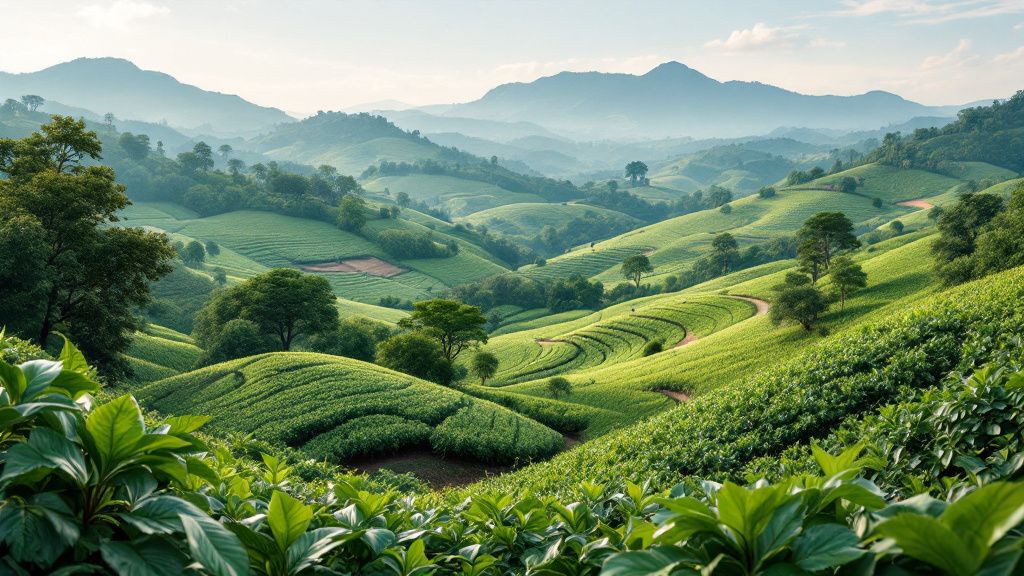The Social Impact of Coffee
Coffee, with its rich aroma and robust flavor, transcends being just a beverage; it plays a pivotal role in shaping social landscapes. You might find that bonding over coffee is a cherished ritual, fostering connections in bustling cafes or during intimate gatherings. The social benefits of coffee are evident in how it brings people together, providing a platform for cultural exchange and shared experiences. Globally, coffee production serves as a vital economic driver, supporting millions of livelihoods and strengthening community ties. Additionally, coffee has a complex relationship with health, where its moderate consumption is often associated with several positive effects, enriching its social impact.

The Origins of Coffee and Its Cultural Significance
The origins of coffee can be traced back to ancient Ethiopia, where legend has it that a goat herder named Kaldi discovered the energizing effects of coffee beans. From there, coffee traded its way to the Middle East and beyond, evolving from a crude stimulant into a refined drink. Coffee's rise accompanied myriad cultural traditions, as each region adopted and adapted the rich brew to suit local tastes, enhancing its unique cultural significance.
If you explore the cultural tapestry surrounding coffee, you'll find it mirroring the civilization it inhabits. In comparison to tea and its often ceremonial associations, coffee's caffeinated vigor has become synonymous with industriousness and social dynamism. This comparison underscores coffee's ability to cross cultural lines and unite diverse groups, embodying social benefits of coffee as it connects varied communities.
You experience the social impact of coffee when its historical and cultural significance becomes intertwined with economic livelihoods and daily rituals. Coffee production supports economies worldwide, fostering community development and offering a source of pride. Moreover, considering coffee's health impact, its cultural journey offers a tale of indulgence intertwined with tradition, where each cup tells stories of distant lands and shared human experience.

Environmental Considerations in Coffee Cultivation
The cultivation of coffee is intricately linked to environmental health, influencing both local ecosystems and broader ecological systems. You might notice that traditional coffee farms, often nestled within biodiverse tropical forests, support a wide range of flora and fauna, promoting ecological balance. Modern agricultural methods, however, can disrupt these environments when not managed sustainably, impacting soil quality and water resources crucial for successful coffee production.
Shifts toward sustainable practices in coffee growing are increasingly crucial. According to recent studies, shade-grown coffee, which grows under a canopy of trees rather than in open fields, preserves biodiversity and reduces carbon emissions. This scientific explanation highlights how sustainability efforts in coffee cultivation help mitigate environmental damage while maintaining productivity, thus keeping the delicate balance of nature.
As a coffee enthusiast, understanding the environmental aspects of your favorite beverage can expand your appreciation for its complexity. Social benefits of coffee consumption are enhanced when sustainability is prioritized, as it supports healthier communities. The impact of coffee production on global ecosystems reflects its broader influence, making environmentally-conscious choices essential for the continued enjoyment and success of coffee worldwide.

Social Connections Fostered by Coffee Consumption
Coffee serves as a universal language, transcending boundaries and fostering social connections. When you gather with friends or colleagues over a cup of coffee, the atmosphere invites conversation and camaraderie. Cafes become vibrant community hubs where ideas flourish, collaborations form, and relationships strengthen, showcasing the social benefits of coffee as it nurtures interpersonal bonds.
Looking at coffee consumption through the lens of cultural exchange, we can see that it acts as a bridge across diverse communities. Whether it's an Italian espresso bar or an Ethiopian coffee ceremony, each tradition shares coffee's unifying power. This unique perspective highlights how coffee catalyzes not only conversation but also cross-cultural understanding and appreciation.
The social impact of coffee extends to health benefits as well, as shared rituals often bring psychological comfort and well-being. These gatherings create positive environments that contribute to mental health, nurturing a sense of belonging. As you sip your favorite blend, you are participating in a global network of coffee enthusiasts, each connected by this shared ritual that continues to bring people together.

The Influence of Coffee on Art and Literature
Coffee has profoundly influenced the creative realms of art and literature throughout history. Artists and writers often find inspiration in the ritual of drinking coffee, using it as a catalyst for creativity. The warm ambiance of cafes has been immortalized in countless paintings and literary works, highlighting the role of coffee as more than just a beverage – it's a muse that fuels artistic expression and story-telling.
To truly understand the influence of coffee on art and literature, you need to shift your mindset from seeing it solely as a morning ritual to recognizing its role as a cultural icon. This new perspective reveals how coffee has become a symbol of intellectualism and creative thought, featuring prominently in the works of figures like Ernest Hemingway and Pablo Picasso. This mindset shift highlights the deeper cultural significance of coffee within the artistic community.
In today's society, the social benefits of coffee extend beyond mere enjoyment, as it fosters environments conducive to creativity. Coffeehouses have long served as spaces where artists and thinkers converge, exchange ideas, and cultivate their craft. The impact of coffee on health is subtly interwoven here, providing the stimulation necessary for prolonged focus and innovation, enriching the tapestry of creative history.

Future Trends in Coffee Consumption
The future of coffee consumption is poised to transform as societal values shift and technology advances. Seeing an increase in sustainable practices, you may notice a growing emphasis on ethical coffee production. Consumers are becoming more aware of environmental impacts and increasingly demand transparency and fairness in their coffee’s journey from farm to cup. This trend supports the social benefits of coffee, aligning it with global efforts toward sustainability.
While many believe that traditional coffee culture will dominate for years to come, there’s a strong case for the rise of innovative consumption methods, such as coffee substitutes and specialty drinks. These alternatives cater to diverse dietary preferences and health-conscious consumers, suggesting that the impact of coffee on health will continue to spark creativity and adaptation within the industry.
Exploring future trends, technology plays an instrumental role in transforming coffee experiences. Advances in brewing methods, digital marketing, and smart devices are reshaping how you enjoy your coffee. The fusion of tradition and technology offers a compelling narrative, balancing heritage with modernity, and ensuring coffee remains an integral part of everyday life. This evolution showcases coffee's resilience and its ability to continually adapt to society's ever-changing needs.
 Ratio Eight S2
Ratio Eight S2
 Ratio Eight Original
Ratio Eight Original
 Ratio Six
Ratio Six
 Ratio Four
Ratio Four
 Compare Machines
Compare Machines






